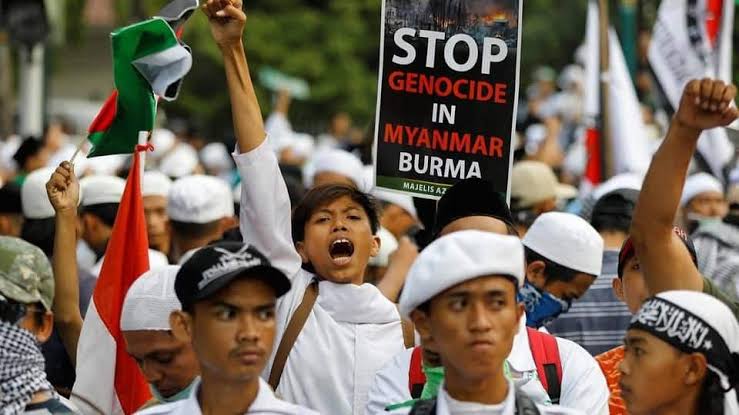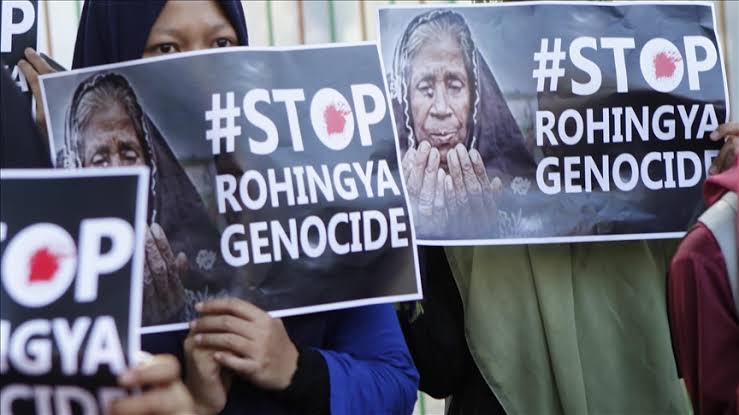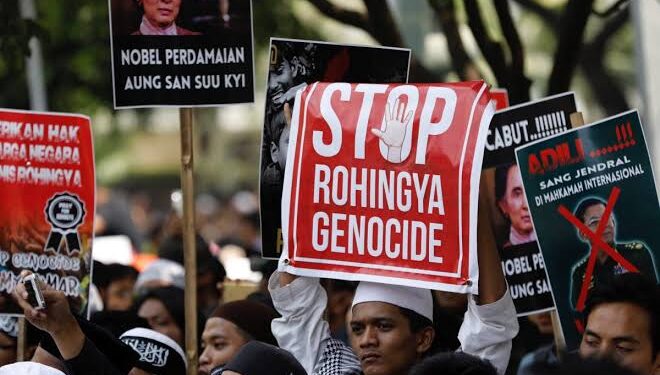As the world observes Interfaith Harmony Week, it becomes increasingly important to raise awareness about the ongoing Rohingya crisis. For 82 years, the Rohingya people have endured systemic violence, displacement, and discrimination, culminating in what many have described as a genocide. Despite overwhelming evidence of atrocities, the international community has yet to take decisive action. This crisis not only calls for humanitarian intervention but also highlights the need for global solidarity and accountability.
History of Persecution
The Rohingya, a Muslim minority in Myanmar, have faced systemic oppression for decades. In 1942, during World War II, tensions between the Rohingya and Rakhine Buddhists escalated, leading to widespread violence and displacement. The Rohingya sided with the British, while many Rakhine Buddhists supported the Japanese, deepening ethnic divisions. In 1982, Myanmar’s government enacted a citizenship law that effectively rendered the Rohingya stateless. This law denied them basic rights and recognition, exacerbating their marginalization.
2017: A Turning Point in Atrocities & Escalation to Genocide
The situation deteriorated dramatically in 2017, when Myanmar military launched a brutal campaign, “clearance operations” against the Rohingya in Rakhine State. As after the Rohingya militants attacked police posts. Myanmar police’s offenses included massacres, sexual violence, and the burning of entire villages. Over 700,000 Rohingya fled to Bangladesh within months, seeking refuge from the atrocities.

A 2018 UN investigation called it a “genocide with genocidal intent.” Satellite imagery confirmed the destruction of 392 villages. Despite these assessments, meaningful accountability has remained elusive.
Cox’s Bazar: A Crisis in Limbo
Over 1 million Rohingya now live in Bangladesh’s Cox’s Bazar, the world’s largest refugee settlement. Monsoon rains regularly flood the bamboo shelters, which is spreading the disease. Bangladesh restricts refugees’ education and work rights, fearing permanent settlement. Donor fatigue has slashed food rations by 33% in 2023, exacerbating malnutrition.
Myanmar’s Junta Deepens the Wound
Myanmar’s 2021 military coup erased hopes of repatriation. Junta leader Min Aung Hlaing, accused of genocide, dismisses Rohingya as “terrorists.” Civilian leader Aung San Suu Kyi, once a Nobel laureate, defended the military at the ICJ in 2019. Post-coup violence has killed over 4,000 civilians, diverting global attention from Rakhine.

Continued Suffering
As of 2024, approximately 600,000 Rohingya remain in Myanmar. They live under severe restrictions, denied citizenship, and basic human rights. They are confined to squalid camps and segregated villages, where movement is heavily restricted, access to education and healthcare is limited, and economic opportunities are virtually nonexistent. The military’s actions against them continue, with reports of arbitrary arrests, forced labor, and sexual violence. Despite international condemnation, the Myanmar junta has only tightened its grip, enforcing policies that deepen the Rohingya’s statelessness and vulnerability. Without urgent intervention, their suffering will only worsen, pushing them further towards the brink of extinction.

Global Condemnation Without Accountability
The UN and Western nations have repeatedly condemned Myanmar’s actions. In 2020, Gambia filed a genocide case against Myanmar at the International Court of Justice (ICJ). The US and EU imposed sanctions on military leaders. Yet, China and Russia shield Myanmar at the Security Council, blocking binding resolutions. ASEAN’s policy of non-interference has further stalled regional pressure.
In November 2024, the International Criminal Court’s chief prosecutor sought an arrest warrant for Myanmar’s military leader, Min Aung Hlaing, accusing him of crimes against humanity. This move represents a significant step toward accountability, yet justice remains distant.
Voices from the Frontlines Rohingya Community
As Interfaith and Harmony Week highlights unity, Rohingya advocates stress the urgency of global solidarity.
Noor Azizah, Director of the Rohingya Maìyafuìnor Collaborative Network, reflects on the prolonged suffering:
“For 82 years, the world has witnessed the slow destruction of the Rohingya people, yet justice remains elusive. Genocide is not just about killing—it is about erasing identity, history, and belonging. The international community must move beyond statements of condemnation and take decisive action. We cannot afford another year of silence while our people vanish from their homeland.”

Yasmin Ullah, Executive Director of the Rohingya Maìyafuìnor Collaborative Network, emphasizes the pivotal role of Rohingya women:
“Rohingya women have always been at the heart of our survival. Even as we endure systemic violence and displacement, it is women who carry the weight of rebuilding. We are the guardians of our culture, the advocates for justice, and the glue that binds our community. Our stories are not just about resilience but about defiance in the face of erasure.”

Paths to Justice: Fragile Progress
The International Criminal Court (ICC) investigates crimes against humanity in Myanmar, while the ICJ case crawls forward. NGOs like Fortify Rights and Amnesty International preserve evidence of atrocities. In September 2023, US lawmakers urged President Biden to formally declare the Rohingya crisis a genocide, a move that could freeze junta assets. Advocates demand ASEAN leverage its influence to hold Myanmar accountable.
Recognition as a Catalyst for Change
Only 14 countries and the UN have labeled Myanmar’s actions genocide. Legal recognition could unlock reparations, refugee resettlement programs, and pressure on Bangladesh to improve camp conditions. It would also counter the junta’s narrative that Rohingya “do not exist.”
The Call for Global Recognition and Action
Despite clear evidence of genocide, the international community has largely failed to act decisively. While some countries have acknowledged the atrocities, comprehensive measures to hold perpetrators accountable are lacking.
The Rohingya crisis is not an isolated incident but a profound human rights violation that demands global attention. As the world observes Interfaith Harmony Week, it is imperative to highlight the plight of the Rohingya. This observance serves as a reminder of the importance of unity and understanding among different faiths and cultures.

The Path Forward
To address the Rohingya crisis, the international community must take concrete steps:
- Legal Accountability: Support international legal proceedings against those responsible for the genocide.
- Humanitarian Assistance: Provide aid to Rohingya refugees and support their safe and voluntary repatriation.
- Policy Advocacy: Pressure Myanmar’s government to amend discriminatory laws and recognize the Rohingya as citizens.
- Global Awareness: Raise awareness about the Rohingya’s plight through education and media initiatives
The Rohingya have endured 82 years of systemic oppression and violence. The time for the world to recognize and act against this genocide is long overdue.
Related Stories:
Escalating Violence Puts Rohingya at Risk Amid Rakhine Conflict
Indonesia Grapples with Escalating Refugee Crisis as Rohingya Boat Pushed Back to Sea
European Nations Unite Against Myanmar: Joint Intervention in Rohingya Genocide Case
















